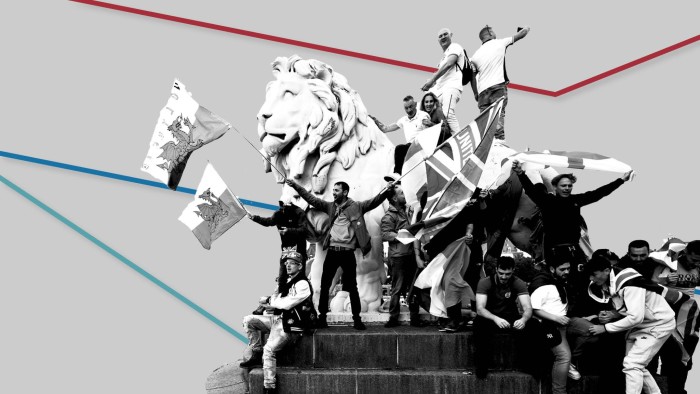Stay informed with free updates
Simply sign up to the Social affairs myFT Digest — delivered directly to your inbox.
Culture wars and immigration tensions have deepened the political fractures revealed by Brexit, according to a study that shows 84 per cent of Britons say the UK feels divided.
More than two-thirds of adults believe culture wars have split the country compared with just 46 per cent in 2020, according to research published on Friday by King’s College London’s Policy Institute and pollster Ipsos.
The study reveals a growing sense of nostalgia for the past and unease about the pace of cultural change, fuelling political divisions and support for Nigel Farage’s Reform UK party despite fading Brexit faultlines.
Social divisions over Brexit and class are healing
Perceived tensions around immigration and politics have intensified over the past few years as divisions between social classes and Brexit voters have started to heal, the data showed.
In 2020 the share of Britons reporting tension with immigrants and between Brexit voters was around 80 per cent. In the past five years, while the former has risen to 86 per cent, the latter has fallen to 52 per cent. Meanwhile the share of Britons reporting tension between different social classes has fallen to 62 per cent from 74 per cent over the same period.
Bobby Duffy, director of the Policy Institute, said Brexit had given a structure and identity to a “long-standing sense of resentment and cultural division” that had previously been “bubbling” under the surface.
“The tension between leave and remain identities has gone down but the divisions and different visions for the country revealed by Brexit have not gone away, they have just morphed into party political splits,” he added.
UK increasingly divided by culture wars
Climate change, transgender rights and Britain’s colonial past continue to split opinion, with the share viewing “woke” as an insult doubling since 2020 to 48 per cent.
These cultural tensions have driven a sense of national division — 84 per cent of Britons say the UK feels divided and 64 per cent view culture wars as a serious issue — along political lines.
As hardening attitudes to immigration have caused a groundswell in support for Reform UK on the right, discontent with Britain’s “broken social contract” has pushed younger generations further to the left.
Politicians and the media accused of stoking division
Two-thirds of people pointed to the media as a driver of division, although the share has declined since 2020. In contrast, the proportion who said politicians “invent or exaggerate culture wars as a political tactic” has jumped from 44 per cent to 60 per cent over the past five years.
Immigration has been a core driver of division for some time, but economic hardship and concerns about political correctness and free speech have also played a role, said Duffy.
“People are not seeing progress and that creates a genuine concern about how the country is changing, which is encouraged by an increasingly divisive rhetoric in politics, media and social media,” he added.
Concern about the pace of cultural change
While the sense of division is felt across the political spectrum, the strength of views among Reform UK supporters sets them apart.
Some 58 per cent of people aligned with Nigel Farage’s party said the UK felt very divided and 38 per cent strongly agreed it was divided by culture wars, compared with 31 per cent and 12 per cent of Labour supporters.
Growing nostalgia for Britain’s past
Nostalgia for Britain’s past was also most evident among right-leaning voters and older generations. However, even among 16- to 24-year-olds the share who would like the UK “to be the way it used to be” has doubled to 31 per cent in the past five years.
This reflects a “marked shift to nostalgic thinking” and a “frightening” increase in national division within just a few years, said Duffy.
“Reform supporters stand out as particularly negative about the direction of the country and sense of division but this points to the real challenge,” he added.








